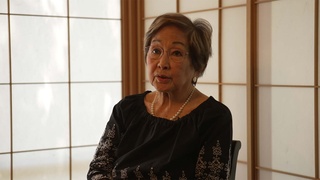Interviews
Mochitsuki tradition
Right after the war, people didn’t have any place to live. And so therefore we had a little community there of our relatives who lived in the barn, in the basement, in the bedroom. We had about seven families living together on the ranch right where you saw…and of course we had our own mochitsuki we started back in 1945. One of my cousins was from Japan and as a result he knew how to do it. My father followed suit. We had every moochitsuki period. We would do our own moochitsuki.
We still do it now. The spirit isn’t there anymore because the next generation, they don’t relate to the Japanese-ness of mochitsuki, they just have an open house. That’s the unfortunate thing about it. We have lost the spirit of the pounding of the rice and the sacredness of the rice and the seiro and putting the mochi to the altar and things like that. A lot of that is being lost. We still go through the motion of having the mochitsuki right now. So that’s how that is. We are stubbornly still continuing that.
Date: March 22, 2018
Location: California, US
Interviewer: John Esaki
Contributed by: Watase Media Arts Center, Japanese American National Museum
Explore More Videos

Representing her Family and the Japanese American Community in Acting
(b. 1932) Nisei American stage, film, and TV actress

Popular Sports in the Nikkei Community (Japanese)
(b. 1962) Nisei Japanese Argentinian, currently residing in Japan

Food preparations for Keirokai
(b.1974) Japanese Colombian who currently resides in the United States

Japanese reputation in Colombia
(b.1974) Japanese Colombian who currently resides in the United States

Interracial marriage trends
(b.1974) Japanese Colombian who currently resides in the United States

Influence of Mexican culture after returning from camp
(b. 1943) Japanese American transgender attorney

Japanese American solidarity
(b. 1943) Japanese American transgender attorney

First Exposure to Animation
(b. 1934) Award-winning Disney animation artist who was incarcerated at Topaz during WWII

Japanese community in Mission
(b. 1922) Canadian Nisei who was unable to return to Canada from Japan until 1952

Learning American cooking
(b.1909) Nisei from Washington. Incarcerated at Tule Lake and Minidoka during WWII. Resettled in Chicago after WWII

Parents in Utah
(b. 1939) a businesswoman whose family volunterily moved to Salt Lake City in Utah during the war.

Not bringing shame to family
(1926 - 2012) Scholar and professor of anthropology. Leader in the establishment of ethnic studies as an academic discipline

Role of the Japanese American National Museum
(1926 - 2012) Scholar and professor of anthropology. Leader in the establishment of ethnic studies as an academic discipline

Understanding Sansei taiko (Japanese)
(b.1943) Shin-issei grand master of taiko; founded San Francisco Taiko Dojo in 1968.

Japanese American community life
(b. 1939) Japanese American painter, printmaker & professor
